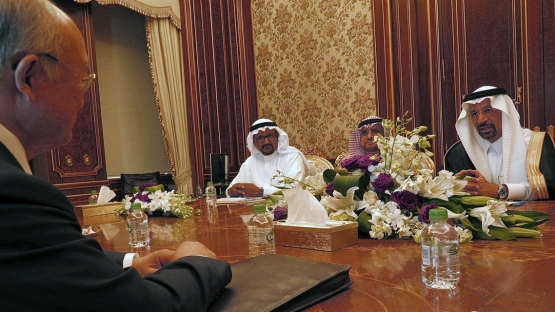IAEA Director General Yukiya Amano highlighted the important role that nuclear science and technology can play in national development during his visit to Qatar and Saudi Arabia on 30 and 31 October.
During his visit to Saudi Arabia on Monday, Mr Amano met with the Minister of Energy, Industry and Mineral Resources Khalid A. Al-Falih to discuss Saudi Arabia’s plans in developing a nuclear power programme. He also visited the King Abdullah City for Atomic and Renewable Energy (K.A.CARE). Under its Vision 2030 National Transformation Plan, the government is looking at how to diversify its energy mix, including through a combination of renewable and nuclear energy options to meet global climate change obligations. Mr Amano assured senior officials that the IAEA would work closely with Saudi Arabia to support them in developing their nuclear programme in coming years.
Earlier on Sunday, Mr Amano highlighted the role that nuclear science and technology can play to help countries reduce poverty and hunger, improve energy supply, treat diseases such as cancer and respond to climate change, in his speech at the University of Qatar in Doha.
“By making peaceful nuclear science and technology available to improve human well-being and prosperity, [the IAEA has] made a real difference to the lives of millions of people throughout the world,” he said.
Mr Amano informed the gathering of students and faculty members about the various state-of-the-art technologies supported by the IAEA to advance the development goals of countries including developing new rice varieties, tackling soil erosion, tracking environmental pollution and managing water supplies. He also spoke about how the role of the sterile insect technique, pioneered by the IAEA, in eradicating the tsetse flies in parts of Africa and how radiography is one of the number of non-destructive evaluation tools, which have helped Nepal and Ecuador to determine damages to public buildings in danger of collapse after earthquakes.
“These are just a few of the many ways in which nuclear technology has become part of our lives,” he underscored.
During his speech, Mr Amano also provided information on how the IAEA is working closely with its Member States to attain the Sustainable Development Goals (SDGs) through the use of relevant nuclear technology.
One of the SDGs he highlighted related to reducing premature deaths from non-communicable diseases such as cancer by one third by 2030.
“Improving access to effective cancer treatment in developing countries has long been a priority for the Agency,” he said. Though many developing countries lack the capacity to offer radiotherapy treatment to cancer patients, the IAEA help countries to establish nuclear medicine and radiotherapy facilities, he added. “We advise on the choice of the most appropriate equipment and provide education and training for oncologists, radiologists, medical physicists and other specialists.”
Mr Amano commended Qatar for their support to the IAEA’s work and also expressed his gratitude for the generous contribution by the Qatar government to the Renovation of the Nuclear Applications Laboratories (ReNuAL) project. He pointed out how the eight nuclear applications laboratories near Vienna offer training to scientists, support research in human health, food and other areas, and provide analytical services to national laboratories.
“The labs are more than 50 years old and a long-overdue modernisation is now underway. I am very grateful to Qatar for pledging a generous contribution to this important project,” he said
The benefits of nuclear power as a valuable source of energy that can help to mitigate the impact of climate change were underscored by Mr Amano. “The IAEA does not attempt to influence countries’ decisions on whether or not to introduce nuclear power. But if countries opt for nuclear power, our job is to help them use it safely, securely and sustainably.”
In conclusion, Mr Amano expressed the hope that the younger generation would see nuclear science as a fascinating field with “far more exciting applications than most people realise.”
During his visit to Qatar, Mr Amano had meetings with senior officials in the Ministry of Foreign Affairs and in the National Committee for the Prohibition of Weapons.





